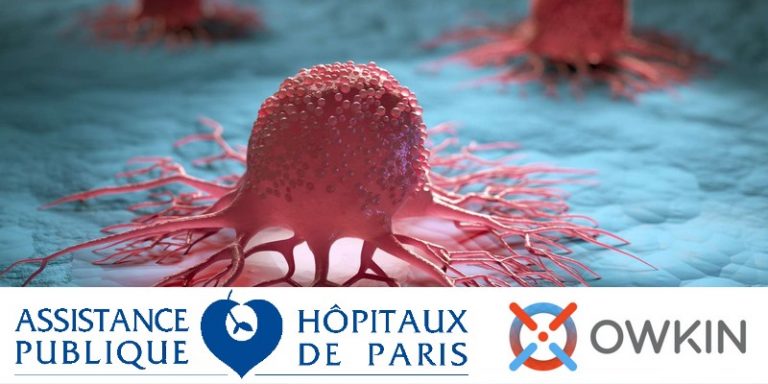
Assistance Publique – Hôpitaux de Paris (AP-HP) and Owkin, a technology start-up specializing in AI and federated learning for research and clinical development, have announced the latest results of their strategic collaboration at ASCO 2021. These include the development of a tool for predicting genomic subtypes of pancreatic cancer using machine learning. The model could open up possibilities for molecular stratification (classification) of patients in clinical care.
A collaboration between AP-HP and Owkin to fight pancreatic cancer
Ductal adenocarcinoma is the most common cancer of the pancreas, accounting for 95% of all pancreatic cancers. Despite this fact, improvements in the health prognosis for these tumours are almost non-existent, while this type of cancer is expected to be the second most common cancer with the highest mortality rate by 2030.
One technique used for pancreatic cancer patients is to determine two tumor transcriptomic signature subtypes that predict whether chemotherapy treatments will work. However, this process is currently complex and not feasible in a routine clinical setting. With this in mind, several researchers and data scientists decided to look into using AI methods to try and find a viable solution to this complex problem.
To make this research possible, AP-HP and Owkin have been collaborating since 2019. Their partnership focuses on two objectives:
- Improving patient care and easily developing new drugs in the field of oncology, immunology and cardiology.
- Democratize access to AI for researchers to foster innovation and medical advances.
A machine learning model to predict genomic subtypes
As part of research jointly conducted by AP-HP and Owkin, the teams have successfully developed a machine learning model to predict the genomic subtypes of pancreatic adenocarcinoma, the most common tumor in pancreatic cancer patients. Gilles Wainrib, Chief Scientific Officer and co-founder of Owkin, discusses the research that went into this solution:
“Our research shows that AI can help connect information at the genomic, cellular and tissue levels, and how this can provide immediate value to make precision medicine a reality for patients. This study further highlights the value of using machine learning to identify histo-genomic signals for cancer research and clinical development.”
Prof. Jérôme Cros, pathologist at Beaujon Hospital AP-HP, explains the techniques used to develop this tool:
“This tool was developed using the unique histological and molecular resources of four hospitals in the AP-HP network (Amboise Paré, Beaujon, Pitié Salpétrière, Saint Antoine) through a unique collaboration between AP-HP pathologists, bioinformaticians from the Ligue Contre le Cancer’s Carte d’Identité des Tumeurs group and Owkin data scientists. It can subtype the tumor at a distance in a few minutes opening the way to numerous applications from basic science (study of intratumoral heterogeneity) to clinical practice (tumor subtyping in clinical trials).”
Further research around AI, oncology and immunology
The creation of this solution follows several other achievements that have been the subject of various and varied publications:
- In January 2021, AP-HP and Owkin published a paper around the AI-Severity Score for Covid-19 patients whose lead author is Michael Blum. This project, resulting from the collaboration of a consortium also including INRIA/CentraleSupélec and Gustave Roussy, was completed in record time thanks to the close coordination and framework agreement established between AP-HP and Owkin. It was demonstrated that the AI-Severity score outperforms other scores currently in use and highlights that effective collaborations such as these can rapidly yield research results with direct clinical utility.
- In August 2020, Owkin announced its predictive AI tool for RNA-seq expression from slide images (HE2RNA) ina publication with Benoit Schmauch and Gilles Wainrib as lead authors. These discoveries are the result of a close collaboration with Prof. Julien Calderaro, anatomo-cyto-pathologist at the Henri-Mondor Hospital AP-HP. This tool can be deployed on all types of cancer. It is a basic element for the generation of transcriptomic results on pancreatic adenocarcinoma.
- Finally, in February 2020, a study around patients with hepatocellular carcinoma was published, again with the help of Prof. Julien Calderaro. In July 2019, Crohn’s disease was studied to design a machine learning model to compare and classify this disease.
Translated from Intelligence artificielle, oncologie et immunologie : AP-HP et Owkin présentent leurs résultats









